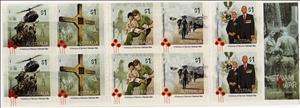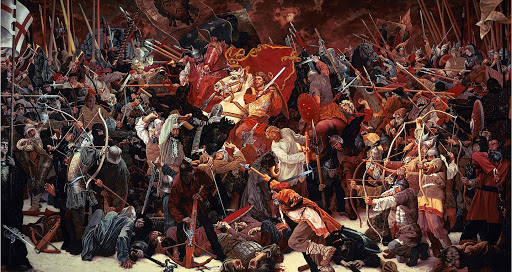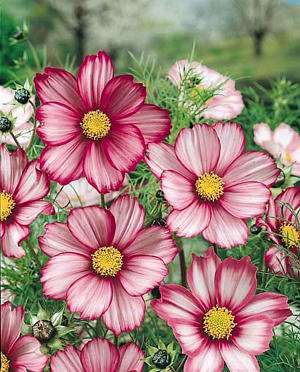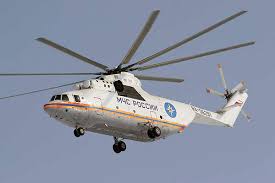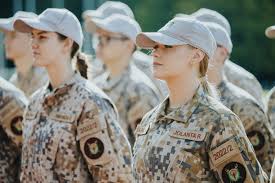Booklet: Vietnam War Self Adhesive Booklet (Australia 2016)
Vietnam War Self Adhesive Booklet (Australia 2016)
11 October (Australia ) within release A Century of Service: Vietnam War goes into circulation Booklet Vietnam War Self Adhesive Booklet face value 10*1 Australian dollar
| Booklet Vietnam War Self Adhesive Booklet in catalogues | |
|---|---|
| Michel: | Mi: AU MH713 |
| Stamp Number: | Sn: AU 4564a |
| Yvert et Tellier: | Yt: AU C4394 |
| Stanley Gibbons: | Sg: AU 4389a-4393abk |
Booklet is square format.
Booklet of 10Also in the issue A Century of Service: Vietnam War:
- Stamp - In the Field face value 1;
- Stamp - Long Tan Cross face value 1;
- Stamp - Aid and Recreation face value 1;
- Stamp - Opposition and Withdrawal face value 1;
- Stamp - Commemoration face value 1;
- Mini Sheet - A Century of Service: Vietnam War Sheet face value 5;
- Stamp - Aid and Recreation face value 1;
- Stamp - Commemoration face value 1;
- Stamp - In the Field face value 1;
- Stamp - Long Tan Cross face value 1;
- Stamp - Opposition and Withdrawal face value 1;
- Booklet - Vietnam War Self Adhesive Booklet face value 10*1;
- Booklet Pane - Commemoration face value 4*1;
- Booklet Pane - Aid and Recreation face value 4*1;
- Booklet Pane - Long Tan Cross face value 4*1;
- Booklet Pane - In the Field face value 4*1;
- Booklet Pane - Opposition and Withdrawal face value 4*1;
Booklet Vietnam War Self Adhesive Booklet it reflects the thematic directions:
A battle is an occurrence of combat in warfare between opposing military units of any number or size. A war usually consists of multiple battles. In general, a battle is a military engagement that is well defined in duration, area, and force commitment.
A cross is a geometrical figure consisting of two intersecting lines or bars, usually perpendicular to each other. The lines usually run vertically and horizontally. A cross of oblique lines, in the shape of the Latin letter X, is termed a saltire in heraldic terminology.
A flower, sometimes known as a bloom or blossom, is the reproductive structure found in plants that are floral (plants of the division Magnoliophyta, also called angiosperms). The biological function of a flower is to effect reproduction, usually by providing a mechanism for the union of sperm with eggs. Flowers may facilitate outcrossing (fusion of sperm and eggs from different individuals in a population) or allow selfing (fusion of sperm and egg from the same flower). Some flowers produce diaspores without fertilization (parthenocarpy). Flowers contain sporangia and are the site where gametophytes develop. Many flowers have evolved to be attractive to animals, so as to cause them to be vectors for the transfer of pollen. After fertilization, the ovary of the flower develops into fruit containing seeds. In addition to facilitating the reproduction of flowering plants, flowers have long been admired and used by humans to beautify their environment, and also as objects of romance, ritual, religion, medicine and as a source of food.
A helicopter is a type of rotorcraft in which lift and thrust are supplied by horizontally spinning rotors. This allows the helicopter to take off and land vertically, to hover, and to fly forward, backward and laterally. These attributes allow helicopters to be used in congested or isolated areas where fixed-wing aircraft and many forms of short take-off and landing (STOL) or short take-off and vertical landing (STOVL) aircraft cannot perform without a runway.
A military, also known collectively as an armed forces, are a heavily armed, highly organized force primarily intended for warfare. Militaries are typically authorized and maintained by a sovereign state, with their members identifiable by a distinct military uniform. They may consist of one or more military branches such as an army, navy, air force, space force, marines, or coast guard. The main task of a military is usually defined as defence of their state and its interests against external armed threats.
Flora is the plant life occurring in a particular region or time, generally the naturally occurring or indigenous—native plant life. The corresponding term for animal life is fauna. Flora, fauna and other forms of life such as fungi are collectively referred to as biota. Sometimes bacteria and fungi are also referred to as flora, as in the terms gut flora or skin flora.
